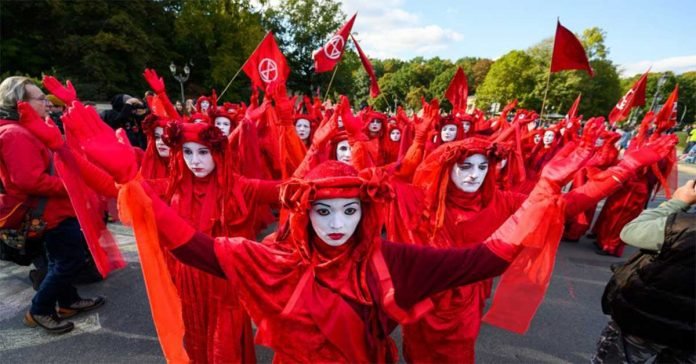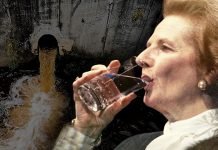Despite there been more Green MEP’s in the European parliament than at any time the EU roll back on its promise climate neutral by 2050
Three central and eastern European countries blocked a new EU climate change target, undermining global action to cut carbon emissions.
EU leaders had hoped to commit all the union’s member states to going carbon neutral by 2050 at a summit in Brussels, but in the end only 25 out of 28 countries were on-board.
Hungary, Poland, and the Czech Republic all refused to support writing the target into the EU’s strategic programme for 2019-24.
A planned reference to the 2050 target to reduce emissions to net zero was removed from the summit’s draft conclusions following the meeting. Instead, a footnote was added, with an explanation that “for a large majority of member states, climate neutrality must be achieved by 2050”.
The conclusions adopted by leaders called on the Commission and Council to carry out further work to ensure a transition to a “climate neutral EU in line with the Paris Agreement.”
A mention of the 2050 aim, which appeared in earlier versions of the text, was struck out after being blocked. However, a footnote states that a majority of EU countries back the mid-century target.
Warsaw doesn’t want to commit to the goal without a burden-sharing mechanism to balance out potentially adverse effects on the economy, according to one EU diplomat in the room. Poland’s position is shared by the Czech Republic and Hungary.
Polish Prime Minister Mateusz Morawiecki said upon arriving at the summit that Poland would not agree to toughening the EU’s climate objectives unless it received enough compensation.
“We [first] need to get very concrete conditions on potential compensation mechanisms … A wording on just and responsible energy transformation is not enough for us,” Morawiecki said.
This failure of EU leaders to commit to a goal of net-zero greenhouse gas (GHG) emissions by 2050 exposes remaining political divisions. The bloc’s major economies are pledging to eliminate emissions, bringing them into line with the global temperature stabilization goals of the Paris Agreement. But the alignment of all 28 member states remains elusive – several countries fear voter backlash if living standards are threatened.
The next step for EU leaders will be to agree on a package that can convince the last holdouts to get on board with the mid-century goal. As another EU diplomat put it: “The Poles like their pork well matured.”
In a statement, Ska Keller, the co-president of the Greens/EFA group in the European Parliament, said that in failing to unanimously agree on the 2050 target, EU leaders had “ignored the urgency once more and put at risk the future of all of us.”
Every day, people suffer from the climate crisis,” she said, adding: “Thousands of people have been going to the streets to protest for climate action and a lot voted for climate protection in the European elections.
Embarrassingly, Poland – one of the hold-out member states which blocked the target – hosted the last UN climate change, COP24, in November. That conference was held in Katowice, Poland’s coal capital – and was used as an opportunity by the country’s right-wing government to lobby in favour of coal and other fossil fuels.
Both Hungary and Poland have right-wing populist governments, while the Czech republic is led by a populist liberal-conservative outfit.
Climate change has soared up the European political agenda in recent months following widespread protests, including continent-wide school strikes and actions by the Extinction Rebellion group. Green parties also make significant gains at the European elections at the end of May.
The United Kingdom and France have voted into law 2050 net-zero emissions targets, setting the two G7 countries on an ambitious path that will require additional policies across economic sectors. The largest emitter in Europe, Germany, has asked for a unified endorsement of mid-century climate neutrality goals. These three countries make up close to half of the bloc’s total emissions.
The Nordic countries – Norway, Sweden, Finland and Denmark – have established plans for net-zero emissions, with varying timetables, either as policy positions or enacted laws. Ireland recently put forth a climate strategy with a 2050 net-zero emissions target, but it remains off-track to meet its shorter-term 2020 and 2030 targets. Portugal has set out a policy roadmap for achieving net-zero emissions and has called on the EU to take-up the mid-century goal.
Another blow to the environment comes as the EU plans to spend more on private jets for top officials.
The European Union is planning to spend millions of euros more on private jet flights for its top officials — just as it is proclaiming its green credentials and pledging to step up the fight against climate change.
The bloc has raised the amount that can be spent under a five-year contract for “air taxi” flights by more than €3.5 million, according to a document published this month in the EU’s tenders database.
The new maximum amount of €10.71 million for the contract, which runs from 2016 to 2021, represents a 50 percent increase on the original value of €7.14 million.

Outgoing European Commission President Jean-Claude Juncker | Frederick Florin/AFP via Getty Images
The plans to spend more on private jets also stand in sharp contrast to remarks by Commission President Jean-Claude Juncker, who has highlighted his use of commercial flights. “When I was talking to Donald Trump, I was constantly looking at my watch so that I wouldn’t miss my flight home,” Juncker told German newspaper Bild am Sonntag earlier this year. “Trump kept saying, ‘Your ‘plane can wait!’ He didn’t realise that I didn’t have my own aeroplane.”
In response to questions from a spokesperson for the Commission said that Juncker had taken 25 flights on private planes in 2018, the same number as in 2017. In 2016, he took 18 private flights, compared with 21 in 2015. Read more on that story from POLITICO.
Current state of emissions
Emissions in Europe fell by only 0.7% between 2017 and 2018. World demand for power has outweighed the growth in clean energy leading to a rise in global emissions for the first time in three years. With Europe responsible for 10% of global GHG emissions, setting a mid-century goal and a concrete strategy for meeting it are crucial steps for guiding the global low carbon transition.
Hurdles ahead
While the EU appears to be on track to meet its GHG reduction goal of 20% by 2020, hurdles remain to get on a long-term path to net-zero. The world’s third largest greenhouse gas emitter, as a bloc, was recently found by an audit of the European Commission to be falling short on cutting emissions in major emitting sectors, including transport, farming and buildings. The question of how we get to neutral emissions by 2050 will, therefore, have to deal with answering how the bloc will meet the interim targets of 2020 and 2030.
Poland is the largest burner of hard coal of any European country, with nearly 80% of its electricity generated from fossil fuels. Germany still burns the most polluting form of coal, lignite, which accounts for about a quarter of its total electricity generation. As a whole, fossil fuels are responsible for 43% of Europe’s electricity production. While renewable s reached a share of 17% of energy consumption in 2017, the pace of growth has slowed in the past three years. The annual average percentage increase in renewable energy was about half of what is needed to reach the 2020 target. Decarbonisation strategies have to be honest – building up a variety of alternative fuel sources, phasing out coal, electrifying and instituting efficiency measures for transport and buildings, and exchanging technology and knowledge to do so are among the ways available for driving the low-carbon transition.

Labour set to commit to net zero emissions by 2030
Labour is poised to commit itself to one of the most radical net zero emissions targets in Europe after members voted to agree to a target of 2030.
Party members voted at the autumn conference in Brighton to back a motion by the campaign group Labour for a Green New Deal to set a fixed date to achieve net zero, as well as nationalising the big six energy firms and guarantee green jobs.
The hope is that Labour will adopt it as official party policy and add the Green New Deal proposal to its next manifesto. Rebecca Long-Bailey, the shadow secretary for business, energy and industrial strategy, is one of the most senior party figures backing the 2030 target.
The Green party has advocated 2030 for a number of years but Labour activists say their motion is broader in scope and contains the most radical collection of environmental policies ever passed by Labour members.
After delegates passed the motion, Labour officially backed the Green New Deal proposition. Anti-climate change activists have said it is the most radical set of left-wing policies to be passed by party members in a generation.
As well as working with scientists and trade unions to work towards net zero carbon emissions by 2030, the Green New Deal also proposes repealing all anti-union laws, banning fracking – which is already Labour policy – decarbonisation by progressive taxation of the wealthiest in society, taking all public transport into public ownership so it is free or affordable.
Labour’s specific transport plans include rail electrification, supporting high speed rail, creating rail freight on the West Coast Mainline, removing HGVs from the roads.
Labour will also want to retrofit zero-carbon measures on social and council housing and public buildings.
“Climate refugees” would be welcomed to the UK while measures would be taken against displacing people from their homes.
It also suggests working collaboratively with farmers to eliminate pollution and greenhouse gas emissions from the agricultural sector.
Labour now has the most ambitious net zero plans in the world
“Labour now has the most ambitious net zero plans in the world. Conference agreed that these should be achieved through massive investment in infrastructure and skills, public ownership of key utilities and supporting climate transition in the global south,” said a Labour Party spokesman.
“Labour’s plans for a Green New Deal will bring about a green industrial revolution which is bold, credible and has climate justice at its heart.”
#ClimateExtinction
#ClimateChange
To save Honda’s workers and the planet we should buy it and build electric cars!
The Extinction Rebellion: A Farting Cow the destroyer of worlds
Support Independent Journalism Today
Our unwavering dedication is to provide you with unbiased news, diverse perspectives, and insightful opinions. We're on a mission to ensure that those in positions of power are held accountable for their actions, but we can't do it alone. Labour Heartlands is primarily funded by me, Paul Knaggs, and by the generous contributions of readers like you. Your donations keep us going and help us uphold the principles of independent journalism. Join us in our quest for truth, transparency, and accountability – donate today and be a part of our mission!
Like everyone else, we're facing challenges, and we need your help to stay online and continue providing crucial journalism. Every contribution, no matter how small, goes a long way in helping us thrive. By becoming one of our donors, you become a vital part of our mission to uncover the truth and uphold the values of democracy.
While we maintain our independence from political affiliations, we stand united against corruption, injustice, and the erosion of free speech, truth, and democracy. We believe in the power of accurate information in a democracy, and we consider facts non-negotiable.
Your support, no matter the amount, can make a significant impact. Together, we can make a difference and continue our journey toward a more informed and just society.
Thank you for supporting Labour Heartlands












